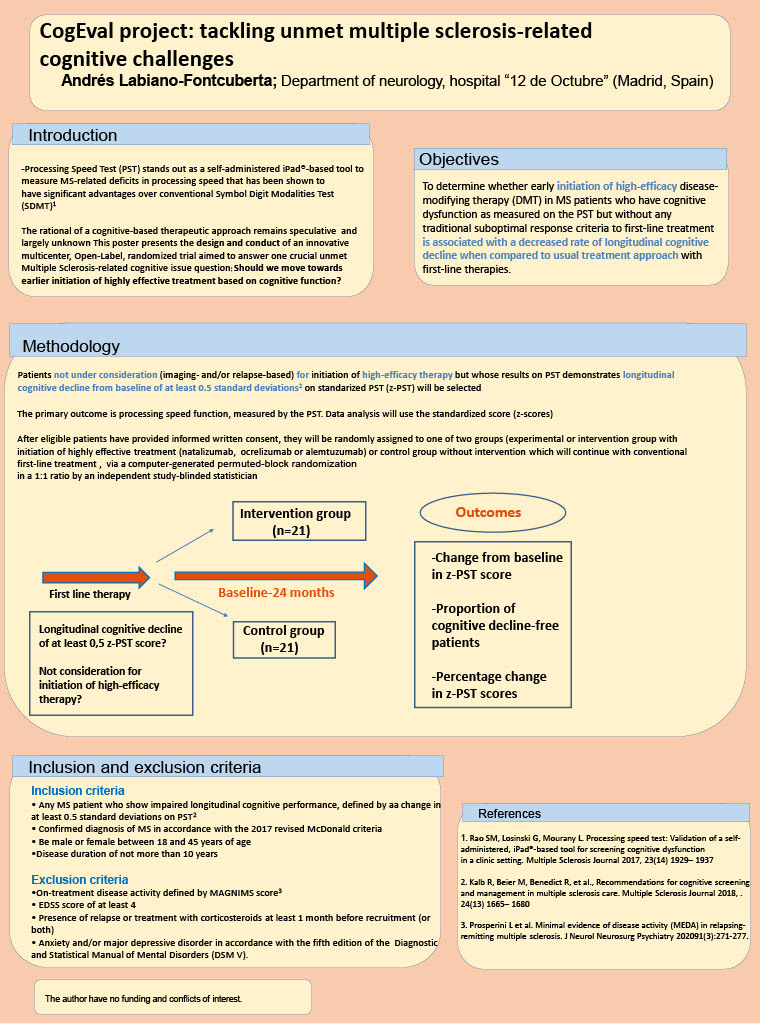CogEval project: tackling unmet multiple sclerosis-related cognitive challenges
Abstract
Study design:
We present the methods and objectives of this randomized open-label pilot study that will be multicentric and conducted in seven centres in Madrid, Spain
Background:
Processing Speed Test (PST) stands out as a self-administered iPad®-based tool to measure MS-related deficits in processing speed that has been shown to overcome the personal resources limitations of time-consuming paper-and-pencil cognitive batteries. Taking advantage of its properties, we aim to promote and incorporate PST as a routine cognitive assessment for every MS patient into MS clinical setting in Madrid, in turn leading to enormous longitudinal datasets from representative samples which would allow us to answer one crucial unmet MS-related cognitive issue question: Should we move towards earlier initiation of highly effective treatment based on cognitive function?
Objective:
to determine whether early initiation of high-efficacy disease-modifying therapy (DMT) in RRMS patients who have cognitive dysfunction as measured on the PST but without any traditional suboptimal response criteria to first-line treatment is associated with a decreased rate of longitudinal cognitive decline when compared to usual treatment approach with first-line therapies.
- Estimated Number of Patients to be Enrolled: 42 (sample size justification will be exposed)
- Planned Duration of Patient Participation: Participants will be enrolled in the study for 24 months.
Methods:
Patients not under consideration (EDSS-, imaging- and/or relapse-based) for initiation of high-efficacy disease-modifying therapy but whose results on PST demonstrates results below normal limits will be selected.
Cognitive dysfunction will be defined by a baseline Z-score performance of at least 1.50 standard deviations (SD) below normative mean OR longitudinal cognitive decline of at least a 4-rawpoints, reduction of 10%, or change in 0.5 standard deviations on PST from baseline. One MRI will always be performed prior to the neuropsychological assessment and major anxiety or depressive disorder should be excluded. Impaired cognitive performance should be confirmed with a short-term (6-week period) reassessment.
Considering the patient’s MS clinical features and evidence of cognitive impairment from the PST assessment, investigating neurologists will decide whether the patient is eligible or ineligible after checking inclusion and exclusion criteria (both will be exposed). Then, they will be randomly assigned to one of two groups (experimental or intervention group with initiation of highly effective treatment (natalizumab or ocrelizumab) or control group without intervention which will continue with conventional first-line treatment) via a computer
generated random number table in a 1:1 ratio by an independent study-blinded statistician.
Primary endpoint: Group comparisons on difference Z-scores (baseline-24 months) on PST
Additional Endpoints The percentage of patients from the experimental group showing improvement in z- scores on PST compared with the control group
Statistical testing strategy:
In order to assess groups’ balance, baseline clinical and demographical subjects will be compared between the two arms using two-sample un-paired test or Mann-Whitney U-test for continuous variables (age, disease duration, EDSS score, number of enhancing lesions) and Chi-squared test or Fisher test for categorical variables (MRI lesions will be divided into three categories: 0-9 lesions, 10-25 lesions, and >25 lesions)
Z-PST scores (baseline-24 months) changes will be compared between the two arms using two-sample un-paired test or Mann-Whitney U-test, as appropriate.
The percentages of patients showing improvement in Z-PST scores (baseline-24 months) changes will be compared between the two arms using Chi-squared test or Fisher test, as appropriate.
All treatment effect analyses will be by intention-to-treat: for the patients in the quasi-control group with occurrence of suboptimal response criteria during follow-up, cognitive z-scores at that moment will be carried forward.

